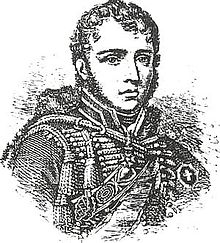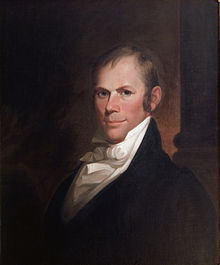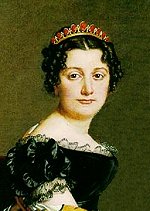Chapter I: Sunshine Soldier and Summer Patriot / Interview
1820

Joseph Bonaparte by Charles Willson Peale, 1820
The men had chosen a poor time to visit him; his house had just burnt down and he was still in the process of transforming his stables into a proper mansion worthy of a former king. Still, the young Count of Santiago de Calimaya had left a favorable impression on him, so he allowed the representatives a chance to meet with him. Their offer, the Mexican crown, was ridiculous. He said,
"Nothing can gratify me more than to see men who would not recognize my authority when I was at Madrid now come to seek me in exile, that I may be at their head."
Still, there was something that Joseph Bonaparte found interesting in the idea of leaving his retirement in Point Breeze. The normally unambitious man was stirred. For the sake of a thought experiment, he invited some people over.
1821

Point Breeze, Joseph Bonaparte’s estate in Bordentown, New Jersey
[The following is a transcript from the internationally-acclaimed and award-winning 1997
miniseries Bien Partes de los Bonapartes. Here, Joseph is depicted as being in the
company of his two daughters, Zénaïde and Charlotte, as well as former Bonapartist commanders Bertrand Clausel, Charles Lallemand, Joseph Lakanal, and Charles Lefebvre-Desnouettes meditating over the death of his younger brother in St. Helena. The party is presenting sitting together in Point Breeze’s salon.]
DON JOSE: He always pushed me to strive for greatness. I would have been content to stay as “King of Mortefontaine,” but he would never allow it. He needed me; Napoleon, the modern Caesar, needed me.
DON LEFEBVRE: You sell yourself short, my friend. If Napoleon was Caesar, then you were Marc Antony.
DONA ZENAIDA: Would you please not compare my father to a man who had to kill himself after a disaster?
D. JOSE: Perhaps I could compare myself to an Octavian?
D. LALLEMAND: What have you in mind?
D. JOSE: A delegation of Mexicans arrived to offer me the crown.
D. CARLOTA: The same Mexicans that rebelled against you in Spain?
D. LALLEMAND: Alliances and loyalties are strange things, mademoiselle.
[D. JOSE rises from his chair and walks over to a portrait of Napoleon. The camera
ZOOMS in from behind at a LOW ANGLE to show the portrait towering over D. JOSE}
D. JOSE My brother was a man of destiny, but where does that leave me? He led armies across Europe with almost divine ambition and exposed to the powers of Europe, those absolute monarchies, the greatness of revolutionary and modern ideals. He led that spirit, he mastered it. Perhaps some of that skill trickled down to me, perhaps by blood, perhaps by mere observation and my own skill. If I am a quarter of the man my brother was, then I am worth more as a leader than a Bourbon or Habsburg. How can I then content myself to sit in what was once a stable when there is glory to be won and a people who desire and need my leadership to reach greatness. From this moment, my thoughts need to be to the glory and service of a country under the yoke of Ancien Régimes.
D. LALLEMAND: Is there to be another Grand Armée?
D. JOSE: There shall be a new Bonaparte Empire, born under the principles and fires of a revolution.
Joseph and his small party did not reach Mexico in time for the revolution. In August, the Treaty of Córdoba was signed between General Agustin de Iturbide and Juan O’Donojú that effectively granted Mexican independence from Spain. By September, the victorious army entered Mexico City and declared independence, establishing the Three Guarantees of Mexican independence: There were would be a Mexican Empire that would preserve the privileges and positions of the Roman Catholic Church; that were would be equality between the various peoples of Mexico; and that the crown would be offered to Ferdinand VII of Spain, then other Bourbon princes, and then other conservative princes.
Joseph and his party arrived in Veracruz in October aboard a privately bought and furnished yacht, El Espiritu de Santa Helena. He lost no time in proclaiming his intention to “offer [his] services to the Mexican government in Mexico City to aid in the formation of the nation.” The Bonapartist party promptly entered Mexico City.
1822

King Ferdinand VII of Spain naturally refused to accept the throne of a country that he wanted to keep control over and claimed that Spain would prevent any other European prince from accepting the throne of Mexico.
Meanwhile, a European prince was working with the Mexican Congress on establishing the Mexican Empire and accepting the throne. Joseph’s chief rival for the throne was General Agustin de Iturbide and one of the strangest friendships in world history formed as General de Iturbide supported Joseph’s ambitions to become Emperor.
A significant amount of historians (and the popular belief) argue that de Iturbide never intended to become Emperor and point to the fact that it was O’Donojú who suggested that the Mexican Congress should give itself the power to appoint an Emperor if Spain refused, a condition that de Iturbide himself didn’t consider in his Plan de Iguala. They also point to the fact that de Iturbide contented himself during the transition period by living lavishly at the Palace of Iturbide as one of the most popular men in Mexico and enjoying his power as head of the army.
It is, however, clear that de Iturbide used his personal standing with the army and people to lobby for ”Don José.”
For his own part, Don José’s ascent to prominence can perhaps be explained by a description of him given by historians Edwards Charles and Edwin Williams who researched his time in the United States for their 1856 work, The History of the Bonaparte Family:
His manners were full of grace, elegance, and blandness; his heart was full of humane feelings; his mind was well balanced, and all his views of life were moderate and cheerful. Wherever he was known, he was respected; and those who loved him once, loved him always.
Conservatives accepted him because of his support for a strong monarch, his eagerness to win favor with and unwillingness to displace the local elites, and support for Roman Catholicism as the state religion. Liberals supported him because of his commitment to ruling with the support of the Council of State in Naples and his reformist liberal credentials in Naples and Spain. The commoners loved him because of the three spectacles he gave them the second half of the year.
The first was a June double wedding in Mexico City presided over by Archbishop of Mexico Pedro José de Fonte y Hernández Miravete. The two brides were the legitimate daughters of Don José: the elder, Doña Zenaida, married her cousin, the recently arrived Charles Lucien Bonaparte (to insure that her descendants would still be of House Bonaparte), and the younger, Doña Carlota, married the eldest son of General de Iturbide, Don Agustin Jerónimo de Iturbide (for several, more ambiguous reasons)
The second was his coronation on 21 July 1822. Amongst a crowd of bishops, congressmen, and citizens of Mexico, President of the Congress Rafael Mangino y Mendivil crowned him as “Emperor José I of Mexico.” The President was behind him, clearly visible as the symbol of the Congress selecting the Emperor. To his left were the Archbishop of Mexico and General de Iturbide, representing the Church and the Army (conservatives) and to his right were authors José Joaquín Fernández de Lizardi and Carlos María de Bustamante, representing the people (liberals).
As he completed his third spectacle, a tour of the Mexican provinces in the core of his empire with his daughters (including his now heir to the throne Princess Zenaida, Princesa de la Unión), to solidify his base and endear himself to the people, news of his appointment flew across the Atlantic and reached the ears of concerned Bourbons in France and Spain.

Joseph Bonaparte by Charles Willson Peale, 1820
“Joseph, though he has much talent and genius, is too good a man, and too fond of amusement and literature, to be a king” Napoleon Bonaparte, former Emperor of the French, to Dr. Barry O’Meara regarding Emperor Jose I, 1817
The men had chosen a poor time to visit him; his house had just burnt down and he was still in the process of transforming his stables into a proper mansion worthy of a former king. Still, the young Count of Santiago de Calimaya had left a favorable impression on him, so he allowed the representatives a chance to meet with him. Their offer, the Mexican crown, was ridiculous. He said,
"Nothing can gratify me more than to see men who would not recognize my authority when I was at Madrid now come to seek me in exile, that I may be at their head."
Still, there was something that Joseph Bonaparte found interesting in the idea of leaving his retirement in Point Breeze. The normally unambitious man was stirred. For the sake of a thought experiment, he invited some people over.
1821

Point Breeze, Joseph Bonaparte’s estate in Bordentown, New Jersey
[The following is a transcript from the internationally-acclaimed and award-winning 1997
miniseries Bien Partes de los Bonapartes. Here, Joseph is depicted as being in the
company of his two daughters, Zénaïde and Charlotte, as well as former Bonapartist commanders Bertrand Clausel, Charles Lallemand, Joseph Lakanal, and Charles Lefebvre-Desnouettes meditating over the death of his younger brother in St. Helena. The party is presenting sitting together in Point Breeze’s salon.]
DON JOSE: He always pushed me to strive for greatness. I would have been content to stay as “King of Mortefontaine,” but he would never allow it. He needed me; Napoleon, the modern Caesar, needed me.
DON LEFEBVRE: You sell yourself short, my friend. If Napoleon was Caesar, then you were Marc Antony.
DONA ZENAIDA: Would you please not compare my father to a man who had to kill himself after a disaster?
D. JOSE: Perhaps I could compare myself to an Octavian?
D. LALLEMAND: What have you in mind?
D. JOSE: A delegation of Mexicans arrived to offer me the crown.
D. CARLOTA: The same Mexicans that rebelled against you in Spain?
D. LALLEMAND: Alliances and loyalties are strange things, mademoiselle.
[D. JOSE rises from his chair and walks over to a portrait of Napoleon. The camera
ZOOMS in from behind at a LOW ANGLE to show the portrait towering over D. JOSE}
D. JOSE My brother was a man of destiny, but where does that leave me? He led armies across Europe with almost divine ambition and exposed to the powers of Europe, those absolute monarchies, the greatness of revolutionary and modern ideals. He led that spirit, he mastered it. Perhaps some of that skill trickled down to me, perhaps by blood, perhaps by mere observation and my own skill. If I am a quarter of the man my brother was, then I am worth more as a leader than a Bourbon or Habsburg. How can I then content myself to sit in what was once a stable when there is glory to be won and a people who desire and need my leadership to reach greatness. From this moment, my thoughts need to be to the glory and service of a country under the yoke of Ancien Régimes.
D. LALLEMAND: Is there to be another Grand Armée?
D. JOSE: There shall be a new Bonaparte Empire, born under the principles and fires of a revolution.
Joseph and his small party did not reach Mexico in time for the revolution. In August, the Treaty of Córdoba was signed between General Agustin de Iturbide and Juan O’Donojú that effectively granted Mexican independence from Spain. By September, the victorious army entered Mexico City and declared independence, establishing the Three Guarantees of Mexican independence: There were would be a Mexican Empire that would preserve the privileges and positions of the Roman Catholic Church; that were would be equality between the various peoples of Mexico; and that the crown would be offered to Ferdinand VII of Spain, then other Bourbon princes, and then other conservative princes.
Joseph and his party arrived in Veracruz in October aboard a privately bought and furnished yacht, El Espiritu de Santa Helena. He lost no time in proclaiming his intention to “offer [his] services to the Mexican government in Mexico City to aid in the formation of the nation.” The Bonapartist party promptly entered Mexico City.
1822

“If your excellency be not the Emperor, then our Independence be damned. We do not wish to be free if your excellency will not be at the lead of our countrymen” José Joaquín Fernández de Lizardi, Marquis de Lizardi, El Pensador, to Emperor José I in search of an invitation to the coronation
King Ferdinand VII of Spain naturally refused to accept the throne of a country that he wanted to keep control over and claimed that Spain would prevent any other European prince from accepting the throne of Mexico.
Meanwhile, a European prince was working with the Mexican Congress on establishing the Mexican Empire and accepting the throne. Joseph’s chief rival for the throne was General Agustin de Iturbide and one of the strangest friendships in world history formed as General de Iturbide supported Joseph’s ambitions to become Emperor.
A significant amount of historians (and the popular belief) argue that de Iturbide never intended to become Emperor and point to the fact that it was O’Donojú who suggested that the Mexican Congress should give itself the power to appoint an Emperor if Spain refused, a condition that de Iturbide himself didn’t consider in his Plan de Iguala. They also point to the fact that de Iturbide contented himself during the transition period by living lavishly at the Palace of Iturbide as one of the most popular men in Mexico and enjoying his power as head of the army.
It is, however, clear that de Iturbide used his personal standing with the army and people to lobby for ”Don José.”
For his own part, Don José’s ascent to prominence can perhaps be explained by a description of him given by historians Edwards Charles and Edwin Williams who researched his time in the United States for their 1856 work, The History of the Bonaparte Family:
His manners were full of grace, elegance, and blandness; his heart was full of humane feelings; his mind was well balanced, and all his views of life were moderate and cheerful. Wherever he was known, he was respected; and those who loved him once, loved him always.
Conservatives accepted him because of his support for a strong monarch, his eagerness to win favor with and unwillingness to displace the local elites, and support for Roman Catholicism as the state religion. Liberals supported him because of his commitment to ruling with the support of the Council of State in Naples and his reformist liberal credentials in Naples and Spain. The commoners loved him because of the three spectacles he gave them the second half of the year.
The first was a June double wedding in Mexico City presided over by Archbishop of Mexico Pedro José de Fonte y Hernández Miravete. The two brides were the legitimate daughters of Don José: the elder, Doña Zenaida, married her cousin, the recently arrived Charles Lucien Bonaparte (to insure that her descendants would still be of House Bonaparte), and the younger, Doña Carlota, married the eldest son of General de Iturbide, Don Agustin Jerónimo de Iturbide (for several, more ambiguous reasons)
The second was his coronation on 21 July 1822. Amongst a crowd of bishops, congressmen, and citizens of Mexico, President of the Congress Rafael Mangino y Mendivil crowned him as “Emperor José I of Mexico.” The President was behind him, clearly visible as the symbol of the Congress selecting the Emperor. To his left were the Archbishop of Mexico and General de Iturbide, representing the Church and the Army (conservatives) and to his right were authors José Joaquín Fernández de Lizardi and Carlos María de Bustamante, representing the people (liberals).
As he completed his third spectacle, a tour of the Mexican provinces in the core of his empire with his daughters (including his now heir to the throne Princess Zenaida, Princesa de la Unión), to solidify his base and endear himself to the people, news of his appointment flew across the Atlantic and reached the ears of concerned Bourbons in France and Spain.












